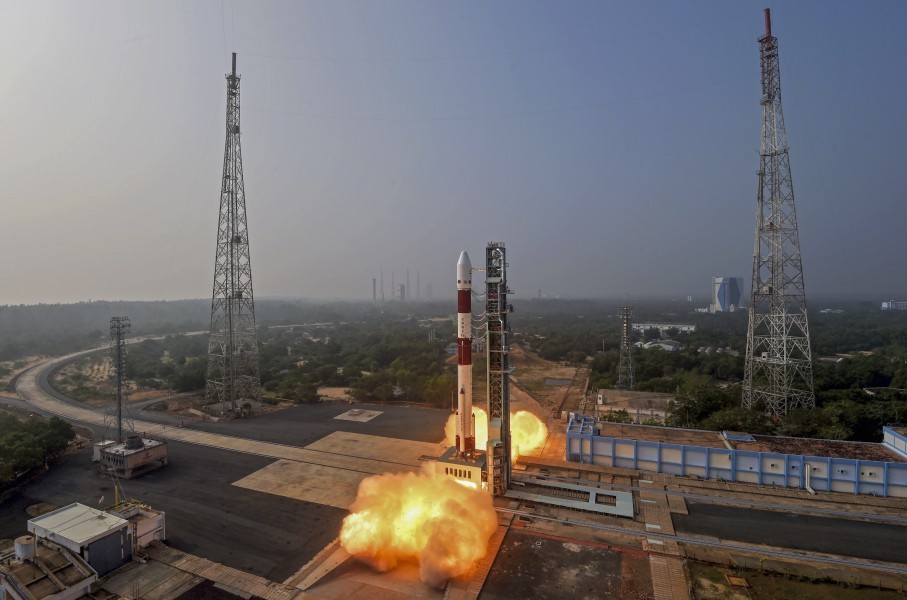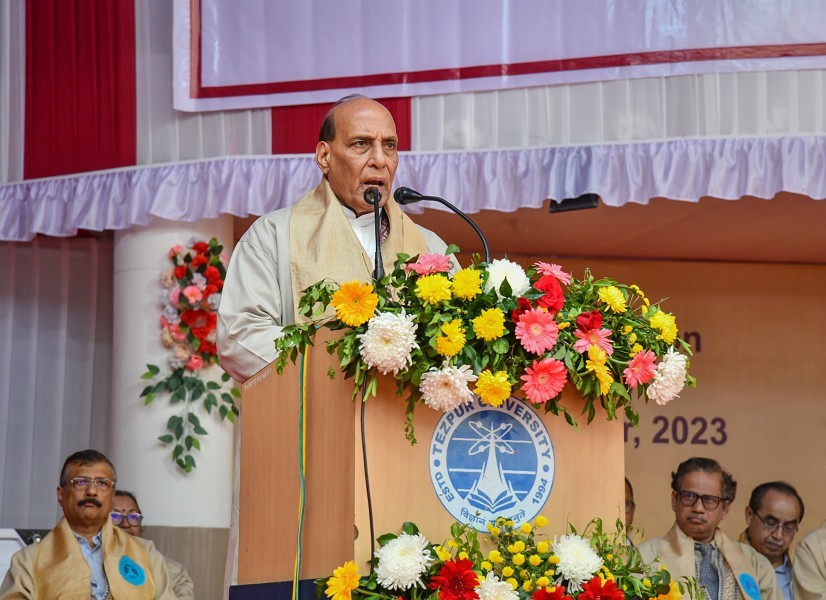
The PSLV-C58 rocket, in its 60th mission, has carried the primary payload XPoSat and deployed it in an intended 650-km low earth orbit. (Photo: PTI)
SRIHARIKOTA, ANDHRA PRADESH (PTI): ISRO on Monday ushered in 2024 with the successful launch of its first X-Ray Polarimeter Satellite that would offer insights into black holes in the space, making the country only the second to conduct experiment into such celestial objects.
Among the payloads that piggybacked the space agency's ever reliable Polar Satellite Launch Vehicle (PSLV) was one made by women, prompting ISRO to call it an inspiration for the country.
The PSLV-C58 rocket, in its 60th mission, carried the primary payload XPoSat and deployed it in an intended 650-km low earth orbit.
Later, scientists performed the orbit lowering maneuver by reducing the altitude to 350-km for conducting the POEM experiment.
Speaking at the Mission Control Centre, ISRO Chairman S Somanath said "happy new year to all of you."
"So on 1 January 2024, yet another successful mission of PSLV has been accomplished. PSLV-C58 has placed the primary satellite XPoSat in the desired orbit."
The main X-ray Polarimeter Satellite (XPoSat) is intended to investigate the polarisation of intense X-ray sources in space. It is the first dedicated scientific satellite from ISRO stable to carry out such research.
US' The National Aeronautics and Space Administration (NASA) had conducted a similar study – the Imaging X-Ray Polarimetry Explorer mission – in December 2021 on the remnants of supernova explosions, the particle streams emitted by black holes and other cosmic events.
"Let me also announce the orbit that has been accomplished which is available through various routes – it shows excellent orbit and the deviations from the targeted orbit is hardly 3 km in circular orbit of 650 km and inclination is 001 degree which is one of the very excellent orbital conditions," Somanath said.
"And yet another announcement is that the solar panel of the satellite has been deployed successfully," he added.
While space-based X-ray astronomy has been established in India focusing on imaging, and time domain studies, Monday's mission marks a major value-addition to the scientific fraternity, ISRO said.
The mission objective includes measuring polarisation of X-rays in the energy band 8-30 keV emanating from about 50 potential cosmic sources, to carry out long term spectral and temporal studies of cosmic x-ray sources.
The X-Ray polarisation serves as a crucial diagnostic tool for examining the radiation mechanism and geometry of celestial sources.
XPoSat is POLIX (Polarimeter Instrument in X-Rays) which is designed to measure polarimetry parameters by Raman Research Institute and XSPECT (X-ray Spectroscopy and Timing) built by the U R Rao Satellite Centre, Bengaluru. The mission life is about 5 years.
XPoSat is expected to bring substantial benefits to the astronomy community globally. Apart from its capability of timing and spectroscopy-based observations, the insights derived from X-ray polarisation measurements on celestial objects like black holes, neutron stars and active galactic nuclei hold the potential to significantly improve the understanding of their physics.
The mission is poised to play a pivotal role in building expertise in X-Ray polarimetry in India, providing a foundation for future advancements and fostering a collaborative network within the astronomy community.
Earlier, soaring majestically from the spaceport in Sriharikota, located about 135 km from Chennai, the PSLV rocket initially deployed the primary satellite into a 650 km Low Earth Orbit, around 21 minutes after lift-off.
Later, the scientists reduced the altitude of the satellite to about 350 km by restarting the fourth stage of the vehicle, for conducting the PSLV Orbital Experimental Module-3 (POEM-3) experiment.
The space agency conducted a similar scientific experiment using POEM-2 in April 2023.
Mission Director Jayakumar M expressed joy over today's "grand success."
"What makes this mission more interesting is the new technologies that are getting demonstrated in the POEM 3 experiment, we have the fuel cell, we have the silicon-based high energy battery, amateur radio satellite service..," he said.
"More importantly, one of the payloads is a total women engineered satellite. This I think showcases the women empowerment in the field of science and technology and all the payloads in fact demonstrate the reforms that are currently in the Indian space sector," he said.
He was referring to the satellite designed by members of the LBS Institute of Technology for Women in Kerala's Thiruvananthapuram.
Somanath said the payload developed by women is inspiring not only for ISRO but also for the country.
"WESAT team has built a satellite by collaborating with ISRO and we were happy to host it on board PSLV POEM. It is an inspiration not only for ISRO but for the entire country know. When girl children are spending their time studying science and when they excel in their domain, we must all appreciate it. So, congratulations to the WESAT team," Somanath said.
POEM-3 experiment was executed to meet the objective of 10 payloads, supplied by ISRO and its subsidiary IN-SPACe.
The electrical power requirements of the fourth stage orbital platform are catered by Flexible Solar Panel in conjunction with 50 Ah Li-ion battery.
The orbital platform consists of avionic systems to take care of navigation, guidance, control and telecommands and orbital platform altitude control system to cater to the control to test the payloads, ISRO said.
The payloads are – Radiation Shielding Experiment Module by TakeMe2Space, Women Engineered Satellite by LBS Institute of Technology for Women, BeliefSat (an amateur radio satellite) built by K J Somaiya Institute of Technology, Green Impulse Transmitter by Inspecity Space Labs Pvt Ltd, LEATTD – Launching Expeditions for Aspiring Technologies Technology Demonstrator by Dhruva Space Pvt Ltd, RUDRA 0.3HPGP and ARKA 200 developed by Bellatrix Aerospace Pvt Ltd, Dust Experiment (DEX) built by PRL, ISRO and Fuel Cell Power System and Si based High Energy cell built by Vikram Sarabhai Space Centre.
 Previous Article
Previous Article Next Article
Next Article












The Indian Air Force, in its flight trials evaluation report submitted before the Defence Ministry l..
view articleAn insight into the Medium Multi-Role Combat Aircraft competition...
view articleSky enthusiasts can now spot the International Space Station (ISS) commanded by Indian-American astr..
view article